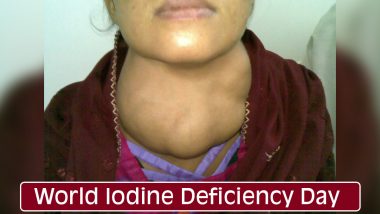Iodine is an essential nutrient and on World Iodine Deficiency Day aka October 21, experts come together every year to raise awareness about the importance of iodine. The lack of iodine in the body can have major repercussions on the body. Therefore, several international health campaigns take place on this day to spread awareness about the iodine and its deficiency. The day is also called the Global Iodine Deficiency Disorders Prevention Day and as the name suggests the day also aims at working towards the prevention of iodine deficiency-related disorders. marked by several developed and developing nations, to effectively tackle complications arising from inadequate mineral intake and keep all associated severe ailments at bay.
What is Iodine Deficiency?
As the name suggests when your system lacks an essential nutrient, iodine it is called having an iodine deficiency. A certain amount of iodine is needed by your body. This helps your body to make a chemical known as thyroid hormone which is responsible for your metabolism and other important body functions a lack thereof can not only cause of low thyroid function but an abnormal enlargement of the thyroid gland, known as a goitre. Apart from that, it can cause mental disabilities in kids.
Iodine Deficiency Symptoms
There are several symptoms of iodine deficiency and it may differ in adults and children:
- Swelling of the thyroid glands in the neck causing a visible lump, called a goitre.
- It can Hypothyroidism which may further cause fatigue, increased sensitivity to cold, constipation, dry skin, weight gain, puffy face, muscle weakness, high blood cholesterol, slow heart rate, depression, amongst others.
- Babies may have symptoms like frequent choking, large tongue, puffy face, constipation, poor muscle tone, poor growth, delayed puberty
- Some kids/teens may have low IQ, trouble learning and mental disabilities
Iodine Deficiency Prevention & Treatment
The best treatment and prevention method of iodine deficiency is a healthy diet and eat natural/wholesome sources of food products that include iodine. You should get enough iodine from your diet but one can even go for iodine supplements. The Recommended Dietary Allowances (RDAs) for adults is 150 micrograms (mcg) per day and since the human body is incapable of making iodine naturally, one can go for an iodine-rich diet via food like fish, eggs, nuts, meats, dairy, seaweed, iodized table salt.
It is important to spread awareness about iodine deficiency because it almost affects about 2 billion people worldwide majorly in developing countries with people having diminished access to healthy food.
(The above story first appeared on LatestLY on Oct 21, 2020 09:20 AM IST. For more news and updates on politics, world, sports, entertainment and lifestyle, log on to our website latestly.com).













 Quickly
Quickly


